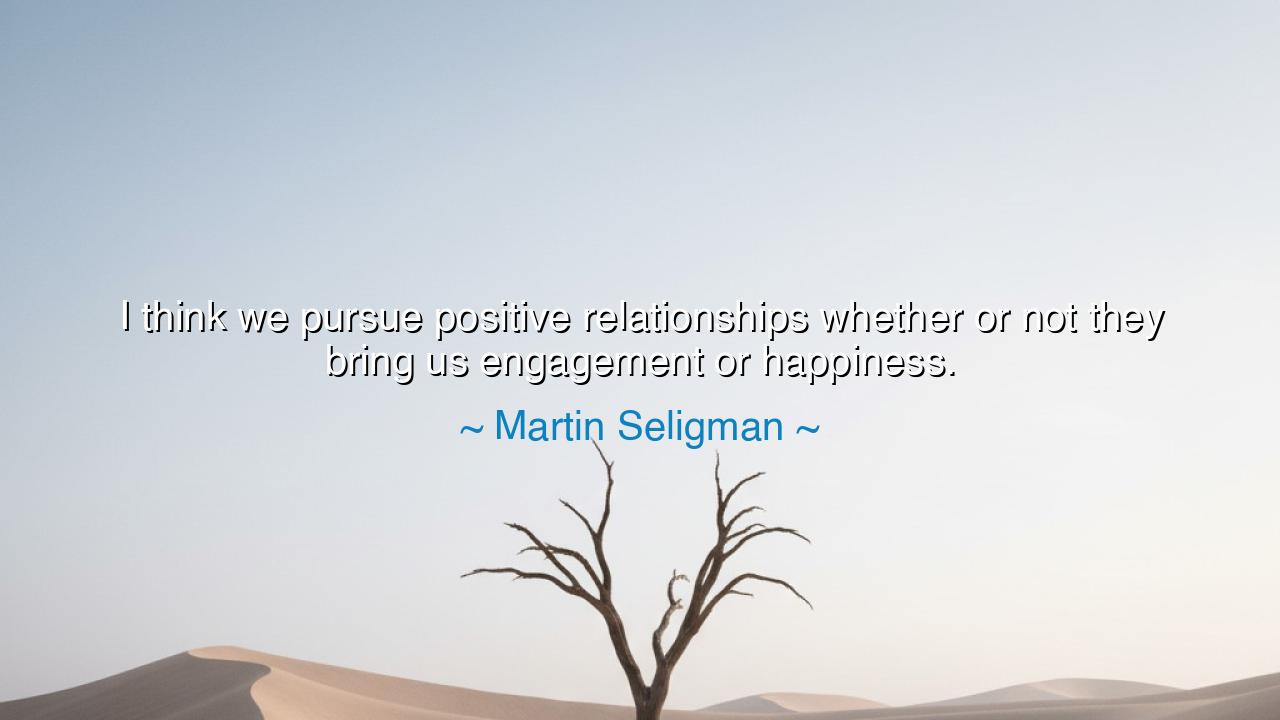
I think we pursue positive relationships whether or not they
I think we pursue positive relationships whether or not they bring us engagement or happiness.






“I think we pursue positive relationships whether or not they bring us engagement or happiness.” Thus spoke Martin Seligman, the father of positive psychology — a man who sought to understand the roots of human flourishing, not in theory alone but in the living soil of the heart. His words speak to a truth as old as humanity itself: that the yearning for connection, the longing to be bound in the golden threads of relationship, is not a mere pursuit of joy, but an instinct as deep as life. We seek others not simply to be happy, but because, at the core of our being, we are not whole alone.
To pursue positive relationships is to follow the ancient pull of the spirit toward unity. From the dawn of time, men and women have gathered around the fire — to tell stories, to weep, to laugh, to share the warmth of presence. Even when such bonds bring pain or disappointment, still we reach out again, compelled by something beyond pleasure: the need to belong, to be seen, to give and receive the sacred gift of understanding. For happiness may fade, engagement may falter, but the desire for love — for kinship, for communion — endures like a flame that cannot die.
Seligman speaks not of shallow companionship, but of the positive relationship, one that uplifts the spirit even through trial. Such relationships are not always easy, nor are they always joyful. They demand patience, forgiveness, and courage. Consider the friendship of Socrates and Plato, bound not by comfort but by the pursuit of truth. When Socrates was condemned to die, Plato was not filled with happiness; his heart was torn. Yet through that loss, his devotion deepened, and he carried his teacher’s wisdom into the ages. Their relationship brought not pleasure, but meaning — the highest form of joy that outlives mere delight.
Indeed, there are moments when love itself brings sorrow, when connection leads not to ease but to sacrifice. Yet even then, the heart does not withdraw. Think of Mother Teresa, who tended to the dying and the forgotten. Her days were not filled with laughter or ease; often she felt a terrible emptiness within. Yet still she served, still she loved, because she understood — as Seligman later articulated — that relationship is not a transaction for happiness, but a calling to transcend the self. Love is not the fruit of joy; it is the soil from which joy eventually grows.
There is a mystery here: why do we, fragile beings, seek bonds that sometimes hurt us, that demand from us more than we can give? It is because the soul remembers what the mind forgets — that we are threads in a single tapestry. Alone, each thread frays; together, they form the pattern of life itself. To live without relationship is to drift without anchor, to echo in an empty cave. Even when love wounds us, the very act of reaching out affirms that we are alive, that we still believe in something larger than the self.
Thus, positive relationships are not measured by constant joy, but by growth — by the silent strengthening of the heart through giving, listening, and understanding. To engage in them is to shape one’s character in the fire of empathy. They teach humility, resilience, and compassion — the virtues upon which all lasting happiness is built. Without such bonds, no wealth of achievement or pleasure can sustain the spirit.
And so, dear seeker, let this truth guide you: pursue relationships not only for joy, but for truth. Be not afraid if they sometimes bring sorrow, for even sorrow shared becomes sacred. Seek out those who challenge your soul as well as those who comfort it. Offer kindness freely, even when none returns, for in giving, you affirm your own humanity. Let your relationships be gardens — sometimes blooming, sometimes barren — but tended always with care. For the measure of a life well lived is not how often it smiles, but how deeply it loves.
In the end, happiness may come and go like sunlight on water, but connection endures like the sea itself. And those who dare to love — not for reward, but for love’s own sake — find themselves woven into something eternal: the quiet, unbreakable harmony of all hearts that have ever reached for one another in the vastness of existence.






AAdministratorAdministrator
Welcome, honored guests. Please leave a comment, we will respond soon